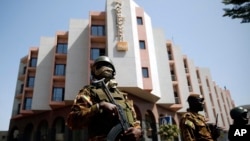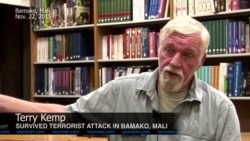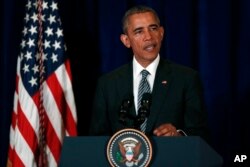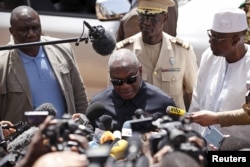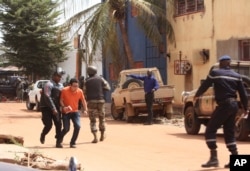Malian authorities searched Sunday for at least three suspects they believe are connected to Friday's deadly jihadist attack on a luxury hotel in the capital Bamako that killed 19 people.
An Army commander said two gunmen who also were killed in the assault on the Radisson Blu Hotel were armed with assault rifles, explosives and a large amount of ammunition. One police official said investigators are following several leads in the case and have recovered evidence in the hotel from the more than seven-hour siege.
A representative from northern Mali separatist groups said the assault on the hotel was an attempt to derail its fragile peace accord signed in June with the Bamako government. The hotel where the attack occurred was preparing to host the latest meeting on implementing the pact.
Two West African militant groups — al-Qaida in the Islamic Maghreb (AQIM) and its affiliate el-Mourabitoune — claimed joint responsibility for the attack. A U.S. defense official called AQIM the "leading suspect" in the assault.
Mali's President Ibrahim Boubacar Keita has declared a state of emergency and three days of mourning starting Monday in the West African nation.
Guinea President Alpha Conde said Sunday his nation will also observe three days of mourning in support of neighboring Mali. He urged his people to be vigilant and report any suspicious people to authorities.
Several Malians were among those killed. Six Russians, three Chinese, two Belgians, a Senegalese, an Israeli and an American were also victims. The American has been identified as international aid worker Anita Datar.
WATCH: U.S. citizen Terry Kemp on how he escaped the attack
Obama condems attack
U.S. President Barack Obama condemned the attack, calling it "appalling" and vowing a "relentless" pursuit of the killers.
Speaking at a summit of regional leaders in Malaysia, Obama said the attack would only stiffen U.S. resolve to combat terrorism.
“Like the heinous attacks we saw in Paris and attacks we see all too often elsewhere, this is another awful reminder that the scourge of terrorism threatens so many of our nations,” said Obama in Kuala Lumpur while attending the annual meeting of the Association of Southeast Asian Nations (ASEAN).
He said America's allies and partners were determined to protect their citizens, push back on the “hateful ideologies that fuel this terrorism,” and root out terrorist networks.
"Everything we can"
In remarks broadcast on state television, Keita said his government would do everything it can "to eradicate terrorism in Mali."
Keita visited the scene of the attack Saturday and told reporters that Mali cared about people’s lives and “will do everything we can to protect them but everybody also has to be watchful."
“We care about your lives and will do everything we can to protect them but everybody also has to be watchful. I wanted to convey to you my esteem and regards and that's why I stopped here to talk to you."
Keita said he has received full support from France and the international community.
"What happened here illustrated more than ever the solidarity between the people, especially the people of France and the people of Mali. When news broke out about this event, President Hollande called me on the phone right away and assured me of the full support from the French people and from his government and this was positively tested. The international community also, through the United States, MINUSMA [United Nations Multidimensional Integrated Stabilization Mission in Mali] has also been at work with us in our country,” he said.
Gunmen went room to room
The Radisson is a popular hotel for foreigners and was reportedly hosting delegates to Malian peace talks. Witnesses said gunmen entered the hotel grounds it a car with diplomatic license plates early Friday morning, then went room to room seeking victims.
"When it started I thought that it was firecrackers. But it went on and on," one hotel guest told VOA's French to Africa Service. "We heard the alarm from the hotel and I even went out of my room... but I noticed a lot of smoke in the hallway.I went back to my room and the Malian soldiers came, knocked on the door, took a small group of us out."
Malian special forces spent several hours going through the 190-room hotel, rescuing guests and tracking down the gunmen.
U.N. peacekeepers stationed in Mali helped with the operation. A number of French troops and two American military personnel, who happened to be in Bamako, assisted outside the hotel.
Condemnation from abroad
Besides the U.S., condemnation also came from U.N. Secretary General Ban Ki-moon and French President Francois Hollande.
Hollande is scheduled to meet with Obama in Washington in the coming days to discuss stepping up France’s contribution to the U.S.-led effort to counter Islamic State militants in Syria and Iraq.
White House Deputy Security Advisor Ben Rhodes said there was “a greater sense of urgency to do more” following November 13th terror attacks in Paris, claimed by Islamic State.
The Economic Community of West African States (ECOWAS) condemned the terrorist attack in Bamako and expressed condolences to the families of the victims and to the government and people of Mali.
Director of Political Affairs at the ECOWAS Commission Remi Ajibewa said that Friday’s attack was a serious threat to the ongoing peace process and stability in Mali. ECOWAS remains resolute to ensure that the region is rid of terror, safe and secure for all of the citizens of the community, he added.
The regional bloc has adopted a two-pronged counter terrorism strategy, with emphasis on human security. Ajibewa said that ECOWAS has teamed up with the Economic Community of Central African States (ECCAS) in a bid to jointly combat terrorism in the two regions.
Ajibewa also called on members of ECOWAS to ensure vigilantes in the countries are disarmed, rehabilitated, and re-integrated into society.
The attack in Mali underscores the threat posed by Islamist militants who remain active in northern and central Mali despite the presence of U.N. peacekeepers.
A French-led military force ousted Islamist groups from power in northern Mali in 2013. The groups had taken over the north after a military coup in Bamako in 2012.
An attack in the capital in March on a restaurant popular with tourists killed five people.
(Peter Clottey, Isabela Cocoli, Kenneth Schwartz, Chris Hannas and William Gallo in Washington contributed to this report.)




